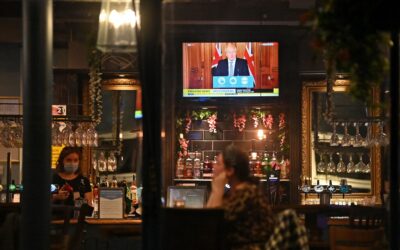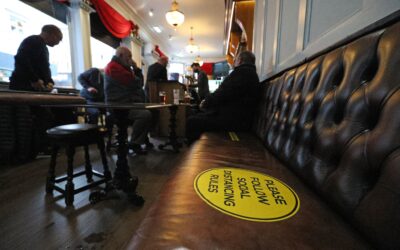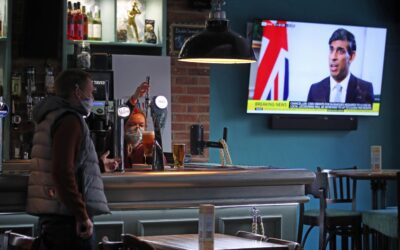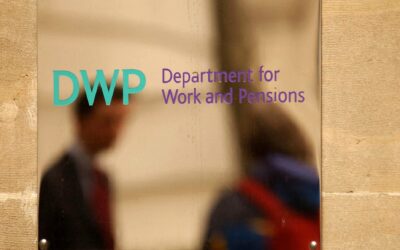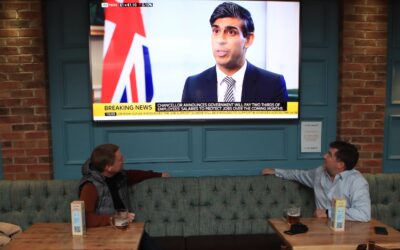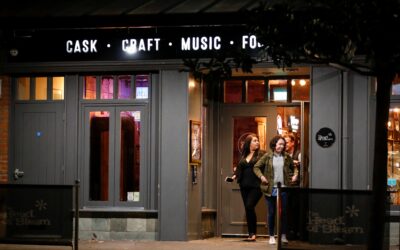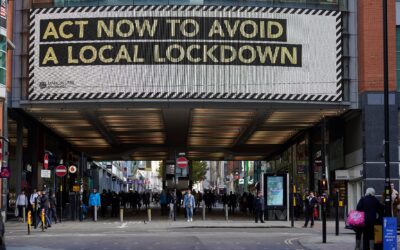Boris Johnson’s announcement of three tiers of lockdown restrictions was supposed to provide clarity, but for many businesses directly affected it has added a further layer of confusion to an already chaotic situation.There is confusion around exactly which businesses are covered by each tier, whether they will be eligible for government support, why some cities are subject to harsher lockdowns than others that are as badly affected by Covid-19, and, after months of backtracking and U-turns, concern that more changes might be on the way.Once again, the grey areas centre around the hospitality industry, an employer of three million people. Watch more“We don’t really know any more than we did yesterday. The devil is in the detail, and it’s still not been announced,” says Matt Farrell, co-founder of Graffiti Spirits Group, which runs bars and restaurants in Liverpool, the first region to be put under the “very high” level of restrictions.“How can you go into the Commons and make an announcement but say the details won’t be known for another 24 hours.“People are trying to run businesses and save livelihoods. We need to order stock and organise rotas. We can’t do that when we don’t know what’s happening. You can’t run a business like that.“We haven’t known if we’ll be able to open. That affects the suppliers, the whole ecosystem.“It mirrors the government’s whole approach. They’ve been two steps behind the virus from the start. There’s no plan, no strategy.”Graffiti Spirits’ late-night bars have laid empty for months and face being closed for a year or more; a prospect Farrell describes as “crazy to even be thinking about”. Its restaurants and food-led bars remain open. They won’t be forced to close but won’t be eligible for additional government support for wages, and trade is already way down. Like many in the industry, Farrell worries that business will fall further now as people are growing more concerned about the virus.“This blasé messaging from the government means no one knows what’s going on. We expected to have clarity but we haven’t got it.”He says he understands the need for public health measures but constant changes serve only to spread fear and worry.“Central government seems so disconnected from local areas. Local authorities know their communities, they know the deprived areas that need help, they know where the hospital admissions are up.”Read moreHe points to figures suggesting pubs, bars and restaurants have not been important venues for transmission and other data showing areas already under local lockdowns have seen case numbers rise.“Are these measures even working?” he asks. And then there are the unwanted side effects of extended restrictions and economic damage. “The mental health aspect is really starting to come to the fore now, it’s really affecting people.”Adam Brooks, who campaigns for the pub industry and runs his own pubs in Essex, also highlighted the grey areas in the latest rules. “Just for people who don’t understand pubs in the modern day, one of mine did 70 per cent food to 30 per cent drink sales last week.”He added: “The government couldn’t legally define the difference between certain pubs and restaurants.”That means many pubs will be able to stay open but won’t be eligible for additional government support announced last week, which is reserved for businesses ordered to close. Many may realise they cannot stay open in any case. The Campaign for Real Ale (Camra) said pubs had been made scapegoats for the pandemic. Public Health England data indicates that less than 5 per cent of transmission has happened in hospitality venues, while the recent rise in infections coincided with children returning to school and students travelling to universities.“In Merseyside, pubs are being forced to close whilst similar businesses like restaurants are allowed to stay open,” said Camra chief executive Tom Stainer.“This is despite the fact publicans have done everything asked of them to make their venues Covid-secure. “In the rest of the country with medium and high alert levels, pubs face severely reduced trade as a result of the government undermining consumer confidence.”Emyr Barton, general manager of The Railway Tavern in Liverpool city centre, told the PA news agency that running a venue with the increasing restrictions was “like trying to run a business with your feet tied together”.Barton added: “I think the restrictions have been driving more and more people to stay in and have house parties.“There is anger and I think it’s not even anger at the situation, not at the fact we’re being locked down, I understand that, but I think the first lockdown was an opportunity to get all of this in place so we could live safely alongside this virus and now this is happening.”James Monaghan, licensee of the Vernon Arms in Liverpool’s Dale Street, said his business has not been viable since the 10pm curfew came in last month.He said the pub has reduced capacity and put in measures including table service, hand sanitiser and a one-way system.
“This sort of breaks your heart a bit because we have done everything right.”
The Independent Articles
UK hospitality businesses prepare legal action against coronavirus restrictions
UK hospitality businesses are mounting a legal challenge to the government’s lockdown restrictions, aiming to halt closure of pubs and bars.The Night Time Industries Association (NTIA) argues that ministers have not presented evidence backing up the effectiveness of closing hospitality venues in stopping Covid-19 transmission.It announced plans for a judicial review ahead of a new three-tier lockdown system announced by the government on Monday.
In tiers two and three under the government’s latest measures, mixing in households will be restricted but restaurants will be allowed to stay open.
In areas under the highest level of restrictions pubs and bars will be closed, unless they can operate as a restaurant and people will be advised against travel in and out of the areas.Read moreIn an announcement made before the latest restrictions were unveiled, NTIA chief executive Michael Kill said: “The industry has been left with no other option but to legally challenge the so called ‘common sense’ approach narrative from government, on the implementation of further restrictions across the North of England,” “These new measures will have a catastrophic impact on late night businesses, and are exacerbated further by an insufficient financial support package,” the statement read.
The NTIA has joined forced with the British Beer and Pub Association, two of the country’s biggest brewers and pub operators, JW Lees and Joseph Holt, and other organisations to bring the review.Miles Robinson, a partner at law firm Mayer Brown said it would be difficult to be successful in a judicial review.“It is not enough to show that the government could have made a better decision, or even that it behaved unreasonably. Read more”Some sort of legal or factual error is usually required. One possible basis for a judicial review is a failure to properly consult with interested parties or take into account relevant factors.”The North of England has seen some of the fastest rises in case numbers over recent weeks. Hospitality businesses are among those taking the biggest financial hit from the pandemic, with many pubs and restaurants struggling despite government support.Government data indicates that a small minority of coronavirus transmission has happened in hospitality venues, with schools, university campuses and workplaces responsible for a greater number of new cases.
The owner of G-A-Y nightclub last week said he would launch a judicial review into the 10pm curfew for pubs, clubs and restaurants. Jeremy Joseph said the curfew was damaging to hospitality businesses and “makes absolutely no sense”.
“It does the opposite of protecting people by pushing them onto the street at the same time. They are going from being safe inside venues with staggered closing times to unsafe on overcrowded streets and overloaded public transport.”
Alex Cruz steps down as British Airways boss
The controversial BA boss has been replaced immediately as chief executive by Sean Doyle, currently the chairman and CEO of Aer Lingus.Both airlines are part of the IAG consortium. Mr Cruz will keep his role as chairman temporarily, but Mr Doyle will take over as chairman “after a transition period,” according to IAG.Mr Cruz became chairman and chief executive of British Airways in April 2016. He arrived after serving as chief executive of the low-cost airline, Vueling.During his tenure, he oversaw significant changes at BA – including the introduction of “buy on board” to replace complimentary catering in economy class on short-haul flights.Read moreHe also faced industrial action by cabin crew and pilots – with a strike by the flight crew dampening celebrations of the airline’s centenary.Mr Cruz also had to deal with a catastrophic IT failure at the airline in 2017, and a data breach in 2018.British Airways has been hit extremely hard by the coronavirus pandemic. Mr Cruz announced up to 12,000 job losses from a workforce of 42,000.The outgoing BA chief executive was widely seen as the personal choice of Willie Walsh, who stepped down as CEO of IAG last month.Luis Gallego, chief executive of IAG, said: “I want to thank Alex for all that he has done at British Airways. He worked tirelessly to modernise the airline in the years leading up to the celebration of its 100th anniversary.“Since then, he has led the airline through a particularly demanding period and has secured restructuring agreements with the vast majority of employees.”Sean Doyle joined British Airways in 1998 and became director of network, fleet and alliances before moving to Aer Lingus as CEO in January 2019. He is being replaced at Aer Lingus on an interim basis by Donal Moriarty, currently the Irish airline’s chief corporate affairs officer.Brian Strutton, general secretary of British Airline Pilots’ Association (Balpa), said: “Mr Cruz has been in the departure lounge for some time so this is no surprise.”He was given a remit to cut costs and found it impossible to do that without alienating BA passengers and employees alike. “I hope this heralds a new dawn which sees BA behaving like the proud flag carrier airline it should be. Balpa looks forward to working constructively with the new CEO, Sean Doyle.”
Targeted furlough scheme lacks clarity and has come too late for some workers, chancellor told
Jobs have been lost due to the delay in announcing a targeted furlough scheme and more support is still needed to help businesses through local lockdowns, the government has been warned.Businesses welcomed Rishi Sunak’s announcement on Friday that the government will pay two-thirds of wages, up to a maximum of £2,100, for firms ordered to close due to virus rules.But there were calls for further clarity about how the scheme would work and exactly who would be eligible.Delay has already cost jobsTorsten Bell, chief executive of the Resolution Foundation, pointed out that the delay in announcing support meant jobs that might have been saved will have been lost.
The foundation, along with unions and business groups, have been calling for targeted furlough support for three months. In the meantime, some employers have already let people go, believing that the furlough scheme was to end on 31 October.Watch more“It has been clear for some time that this form of a more sectorally and geographically targeted furlough scheme would be required to see us through a difficult winter,” Mr Bell said. “The delay in putting it in place will have come at a high price in jobs lost.“Economic policy now needs to keep pace with the spread of this virus, if we are to suppress both the disease and the rise in unemployment that is now under way. We need more support for the six in seven workers who do not qualify for a £500 payment if they are required to self-isolate. The Job Support Scheme also needs to give firms a clearer incentive to cut hours rather than jobs in the difficult months to come.”More help neededTUC general secretary Frances O’Grady welcomed the additional support but warned ministers need to do more “to stop the devastation of mass unemployment”.“Firms which aren’t required to close but will still be hit by stricter local restrictions need a more generous short-time working scheme. And there needs to be extra help for self-employed people in local lockdown areas too. “Nationally, industries like the arts, hospitality, retail and aviation face a long, tough winter. These sectors need targeted help. And we need proper investment to create good new jobs in the green tech of the future.”
‘Very light on detail’Rustom Tata, chair of city law firm DMH Stallard, said it was not yet clear how the scheme would work and precisely which businesses would be ordered to close in any local lockdowns.“The reference to two thirds of wages being paid will of course again be subject to limits, and there will presumably also be qualifying conditions around when the individual worker needs to have started working for the employer.“The further support has been described as an ‘expansion of the Job Support Scheme’, but we still don’t have the real detail about how the successor to the furlough scheme is to operate.“We await detail as to precisely which businesses will be ordered to close. As the first minister in Scotland has found, describing that clearly isn’t a piece of cake.”Read moreThe only venues currently required by law to be closed across England (and therefore able to access this new scheme) are nightclubs, dance halls, discotheques, sexual entertainment venues and hostess bars. Pubs and restaurants are expected to be added to that list for areas subject to local lockdowns.
What about those affected but not required to close?By targeting support, the government creates grey areas where it is not clear who is eligible and who isn’t, which could cause problems.Pinsent Masons employment partner Dr Anne Sammon explained: “Where, for example, a retailer has to close because of local restrictions, the staff who work in that particular branch would seem to be in scope, but what about the support functions for that specific region, like the HR person? “In theory, they may be able to carry out their role from home but have little to no work to do, so will an employer benefit from the government funding for their wages too? Employers need further information and clear guidelines around this otherwise we may see a number of difficult cases arising.”A lifeline“This new intervention should provide a lifeline for many companies and people impacted by the efforts to stop the virus spreading,” said Roger Barker, director of policy at the Institute of Directors. “Alongside wage support, ramping up grants for affected firms marks a sensible step.“The government should also remain alive to the potential second-order impacts of local lockdowns – which will affect firms in other areas and across the supply chain. Discretionary grants allocated through local authorities could help to address these issues, as could further modifications to the Jobs Support Scheme.”
HSBC criticised for net-zero emissions plan that fails to commit to ending fossil fuel finance
HSBC has pledged to reach net-zero carbon emissions by 2050 but campaigners criticised the plan for failing to make any firm commitments in the near-term.
Europe’s biggest bank and second-largest financial backer of fossil fuel companies said on Friday it would reach net zero in its own operations by 2030.It also plans to support its customers with $775bn to $1 trillion (£580bn to £770bn) of finance to aid their energy transition.In an open letter to clients, HSBC chief executive Noel Quinn said the bank was responding to customers’ concerns about climate change.
Read more”We know this is an issue that many of our 40 million customers care deeply about, particularly in our retail and private banking businesses,” Mr Quinn wrote. “They care as citizens, consumers, and business owners. We are committed to developing products that allow them to invest or participate in efforts to bring about a more sustainable global economy.
Campaigners said the plan lacked credibility as the bank laid out no timeline for when it would begin to phase out support for coal and companies involved in further oil and gas extraction.
“A 550-word statement and not a single concrete commitment made by HSBC. This is zero ambition, not ‘Net Zero Ambition,’ said Adam McGibbon, UK energy finance Campaigner, at Market Forces.
Becky Jarvis, coordinator of Fund Our Future UK, a network of campaign groups, said: “HSBC’s net-zero commitment is a bit like saying you’ll give up smoking by 2050, but continuing to buy a pack a week, or even smoking more.”Any further financing of oil, gas, and coal expansion today is utterly at odds with a net-zero commitment by 2050.”Jeanne Martin, senior campaign manager, ShareAction, welcomed HSBC’s commitment to net zero but said it needed to be backed up by targets to phase out fossil financing. “As Europe’s second largest financier of fossil fuels, we urge HSBC to commit to a global coal phase out and take immediate steps to curb its fossil fuel financing. “This would leave no doubt of the bank’s commitment to net zero by 2050 – and give the world a chance to avert the worst consequences of climate change.”
Four million families face ‘significant decline’ in income under plans to scrap universal credit increase
Four million households face a “significant decline” in their income under government plans to scrap the £20 a week increase in universal credit, a report has warned.The Institute for Fiscal Studies said that millions would lose an average of 13 per cent of their benefits if the cut goes ahead in April as planned. The think tank said the UK’s welfare system is “ripe for reform” as it laid out the choices facing the government. With unemployment already rising and forecast to spike over the winter, many more households are expected to be reliant on the benefit system, one of the least generous of a wealthy nation.Read moreThe government again this week resisted calls to keep the £20 uplift brought in at the start of the pandemic.
Even with the increase, a single childless worker on average earnings who lost her job receives just 17 per cent of her usual income in benefits, the IFS calculated. That compares with an average of 20 per cent in the members of the Organisation for Economic Cooperation and Development (OECD).However, the true gulf is much wider — 17 per cent versus 55 per cent — once contributory benefits are taken into account.These are benefits where the level of payment depends on your work history, and these benefits make up a far larger proportion of most other countries’s welfare systems.New research from the IFS lays out “tough choices” for the government. Ministers could choose to make the £20 per week increase permanent, which would add 10 per cent to the cost of universal credit, although that would “undo at most two-thirds of the benefit cuts made since 2015, let alone those made during the coalition”, the IFS said.If the government chose to make all of its temporary increases to benefits permanent, the overall costs of the system would increase by a quarter this year
Read moreThat would mean an extra £26bn added to the benefits bill this year, if unemployment rises and earnings fall in line with expectations, the IFS said.”Regardless of the decision made about the size of the [benefit] system, the government should certainly take the opportunity to improve aspects of the working-age welfare system that were already ripe for reform before the crisis,” the IFS said.During his winter economic statement, Rishi Sunak, the chancellor, made it clear the government was not extending the temporary uplift in payments, despite pressure from opposition parties and campaigners. Tackled twice on the issue by the SNP’s Westminster leader Ian Blackford at Prime Minister’s Questions on Wednesday, Boris Johnson refused to commit to making the increase in universal credit permanent, simply telling MPs the government would “continue to support families across this country”.Pressed a third time by the Labour MP Stephen Timms, the prime minister added: “Of course, we keep all these things under constant review.”
Wendy Chamberlain, the Liberal Democrat spokesperson for work and pensions, said the government would be guilty of “heartlessness at its worst” if it cuts benefits while millions of people are struggling.“With the furlough scheme due to end this month and more business lockdowns expected soon, unemployment is set to soar. If ministers go ahead with their plan, millions will face financial ruin,” she said.“The boost to welfare payments must be extended beyond next April alongside the extension of furlough. Ultimately, this should only be the start of a fundamental rethink of our welfare system.”The IFS also recommends reforming housing benefit, which had “bizarrely” been linked to rents in each local area in 2011. This meant families in areas that have since become more expensive were eligible for less support than otherwise-equivalent families in low-rent ones.That was temporarily scrapped in March, with housing benefit linked to current rents, an improvement that should be made permanent, according to the IFS.Pascale Bourquin, a research economist at IFS and an author of the report, said: “There may well be a case for a more generous benefit system, but not necessarily in the way in which increases were implemented at speed this year. “A more serious review of the treatment of, for example, housing costs and of the self-employed is required. Simply reverting to the pre-Covid system would mean going back to a world where self-employed UC [universal credit] claimants are penalised for having incomes that fluctuate within the year, and where housing benefits are based on local rents from a decade ago.”A Department for Work and Pensions spokesperson said: “This government is wholly committed to supporting the lowest-paid families and has already taken significant steps, including raising the living wage, ending the benefit freeze and increasing work incentives.
“During this challenging time we have provided £9.3bn extra welfare support to help those most in need, as well as introducing income protection schemes, mortgage holidays and additional support for renters, and constantly keep these measures under review.”
Rishi Sunak’s furlough U-turn leaves him groping for a coherent economic strategy
The furlough “cannot and should not go on forever” declared Rishi Sunak back in July.And who would disagree with that? Indeed, who was calling for never-ending furlough? The chancellor was knocking down a straw man.What people were pointing out was that if there was another spike in coronavirus cases and a return to restrictions on the economy it would be sensible for the chancellor to retain the option of keeping furlough (technically known as the Coronavirus Job Retention Scheme) in place.
UK economy grew 2.1% in August as recovery slowed down dramatically
The UK economy grew 2.1 per cent in August as the recovery from lockdown slowed, despite Rishi Sunak’s Eat Out to Help Out scheme, official figures show.It came after a 6.6 per cent increase in output in July but means the economy remains 9.2 per cent below its peak reached before the coronavirus pandemic, the Office for National Statistics reported.UK gross domestic product (GDP) fell at its fastest quarterly rate on record during lockdown, contracting by a fifth as businesses were forced to close and people stayed at home.The latest monthly GDP estimate, which came in well below 4.6 per cent growth forecast by analysts, will cause concern for the chancellor.The services sector which makes up four fifths of the UK economy, remains 9.6 per cent below its pre-pandemic level with a further contraction on the horizon as ministers reportedly consider shutting pubs and restaurants in parts of northern England.Read moreWeak economic performance is not limited to services however. Construction remains 10.8 per cent below February’s level. Agriculture is 4.3 per cent down and manufacturing 8.5 per cent.The ONS’s deputy national statistician for economic statistics Jonathan Athow said: “The economy continued to recover in August but by less than in recent months.
“There was strong growth in restaurants and accommodation due to the easing of lockdown rules, the Eat Out to Help Out scheme, and people choosing summer staycations. However, many other parts of the service sector recorded muted growth.
“Construction also continued its recovery, with a significant boost from housebuilding. There was limited growth in manufacturing, which remains down on its pre-pandemic level, with car and aircraft production still much lower than the start of the year.”Economists warned of a tough few months ahead as coronavirus case numbers rise and government support for businesses is reduced.“While there are positive indications from the Bank of England of growth returning to pre pandemic levels before Christmas, this is far from a done deal,” said Tom Stevenson, investment director at Fidelity International. “The furlough scheme comes to an end this month and there is a real danger that fear of unemployment triggers a negative feedback loop of precautionary saving and dampens consumer confidence. Covid-19 cases are rising quickly in some parts of the country, with further localised lockdowns expected to be announced on Monday. This will undoubtedly hit output as the country braces itself for a long, difficult winter.”The chancellor is set to announce the next stage of his Job Support Scheme later on Friday.A Treasury spokesperson said: “The Chancellor will be setting out the next stage of the Job Support Scheme later today that will protect jobs and provide a safety net for those businesses that may have to close in the coming weeks and months.”The scheme, which replaces the successful Job Retention Scheme, or furlough, has faced criticism from business groups, unions and the Labour party.It is substantially less generous than furlough and includes an incentive to cut jobs rather than keep staff but reduce their hours. In the latest announcement, Mr Sunak is set to unveil a local furlough scheme in which the government will subsidise the wages of workers in pubs, restaurants and other business forced to close under coronavirus restrictions.The new scheme will reportedly see workers paid two-thirds of their wages for the duration of closure.
Confusion and uncertainty reign as pubs and bars grapple with the prospect of more local lockdowns
Large areas of northern England and the Midlands look set to join central Scotland in facing new restrictions to halt a second wave of coronavirus. Manchester, Liverpool and Newcastle – cities famed for their vibrant pubs, bars and music venues – are among those that could go quiet next week if government plans are confirmed.Reports of those plans are fuelling a growing sense of unfairness in many areas, particularly those that have already been subjected to tougher restrictions while some southern areas, notably Boris Johnson’s own constituency, have escaped despite high infection rates.
Could local lockdowns end up making left behind places even poorer?
Is the coronavirus actually levelling Britain down? Different parts of the UK have been subject to different levels of restrictions in this pandemic. On the face of it this discrepancy is justified by the varying rates at which the infection is spreading around the country. In England, parts of the northwest are currently registering around 80 new daily cases per 100,000 people – which means the epidemic is spreading around eight times faster there than it is in the southeast.

